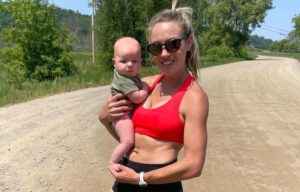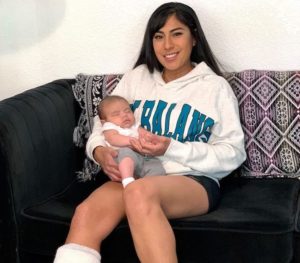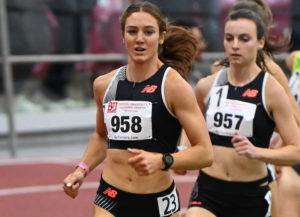
By Alison Wade
At the 2019 Houston Half Marathon Emily Sisson ran 1:07:30 and missed Molly Huddle’s American half marathon record by five seconds. The next time out, Sisson came even closer, running 1:07:26 at the 2020 Valencia Half Marathon, missing the record by one second.
In January, the target moved when Sara Hall lowered the record to 1:07:15 at the Houston Half Marathon. And on Saturday in Indianapolis, Sisson finally took ownership of the record (pending ratification), running 1:07:11 to win the USATF Half Marathon Championships.
Sisson didn’t broadcast that this would be a record attempt in advance, because she wasn’t completely confident that she’d make it to the starting line, and she wasn’t sure how things would go after she contracted Covid at the end of March. After pulling out of two races last month, she didn’t want to announce and then back out of another one.
“When we picked this race, training had been going really well,” Sisson said. “We knew, because it was in the Midwest, that the weather would be hit or miss, but we didn’t need perfect conditions, we just needed decent ones, because we thought my fitness was there. And then with the last few weeks not going great, I was like, ‘I probably need closer to perfect, but I’m going to give it a shot.’”
Saturday’s temperature was good, but it was windy out there. With the help of her agent, Sisson arranged in advance for pacers Brian Harvey and Eric Ashe, both Olympic Trials qualifiers in the marathon, neither of whom she knew previously, to help her out. Harvey went the full distance and Ashe dropped back just before six miles. “Having pacers made a world of difference today because I was hurting pretty bad,” she said.
Sisson felt relatively relaxed until around six miles in, where the course enters the Indianapolis Motor Speedway, a particularly windy section of the course. “I suddenly went from feeling really good to really not feeling great, and I didn’t feel great for the rest of the race, but I was able to just grind it out,” she said. “The last three miles, I was like, ‘Just keep moving, don’t slow down.’ I knew once I got close to the finish line I’d be able to pick it up a little bit.”
She needed to run about 5:07.8/mile, or just over 15:56 per 5K, to break the record, and she went out ahead of pace, splitting 15:54 for 5K. She hit 10K in 31:57 (a 16:03 5K split), slightly behind record pace, 15K in 47:54 (a 15:57), and 20K in 1:03:52 (a 15:58), still slightly behind pace. It was only between 20K in the finish that Sisson made up the ground necessary to break the record.
Although Sisson was thrilled to finally get the record, she’s already thinking about running faster, when she can get in a smoother buildup. “I feel like all the records are just being borrowed right now, because a lot of American distance runners are about to run a lot faster in the half and the full marathon,” she said. “I am really happy with my performance, and part of it is just that I’m happy that I’m back racing and I was able to still come out and do this today. But I was saying to my husband, ‘I want to run faster.’”
Sisson points out that there aren’t many high level opportunities to run a fast half marathon in the U.S.—she considered going to Portugal instead of Indianapolis—but if the top American runners find the opportunities and the timing is right, there’s a lot of untapped potential.
Before she contracted Covid, Sisson was planning to go out in mid-66 pace, and ideally pick it up at the end. When Sisson tested positive at the end of March, she wasn’t particularly sick, but getting back to high level training was difficult. Her heart rate was higher than usual, she was having trouble breathing, and she was feeling tightness in her chest, which would linger for a couple days after a workout. It wasn’t until she came down to sea level that she was able to complete her first workout, about two and a half weeks before the race. Because she felt so significantly better at sea level, she ended up spending the last two weeks of her buildup in Phoenix, rather than her home in Flagstaff. “I don’t know if it was just timing or if altitude did make it a bit harder to recover. But breathing up at 7,000 feet’s not easy anyway,” she said.
The past year has been full of ups and downs for Sisson. She made her first Olympic team, winning the 10,000m at the Olympic Trials in spectacular fashion, but then she got injured in July. She finished 10th in the 10,000m at the Olympic Games, despite the injury, but it took three months before she was able to run more than five miles again. Sisson had to withdraw from the New York City Marathon, but by the beginning of March, she was fit enough to dominate her first race back, the USATF 15K Championships. Then she got Covid.
Now that things are on the upswing again, Sisson is looking forward to having more racing opportunities. “The last couple of years I haven’t raced as much as I’ve wanted to and I really just want that experience of throwing myself into a bunch of races—different distances, different types of races,” she said. She plans to run the New York Mini 10K on June 11, a fall marathon, and other events to be determined. She’s also looking forward to more head-to-head competition. She has dominated the two races she has run in 2022, including winning Saturday’s half marathon by just over six minutes. But she knows there’s plenty of competition out there.
“Distance running on the road, on the women’s side, is really is taking off,” Sisson said. “It’s exciting to see. I can think of like five people that could probably go for this record now. It’s just so deep.”
To have content like this delivered to your inbox each Monday morning, subscribe to the Fast Women newsletter here.





